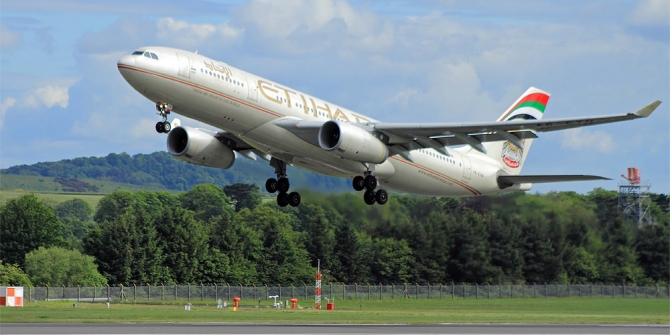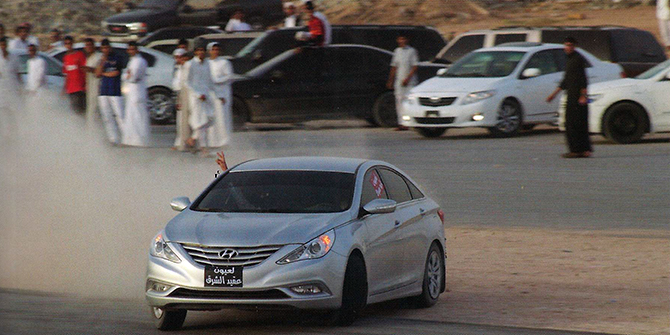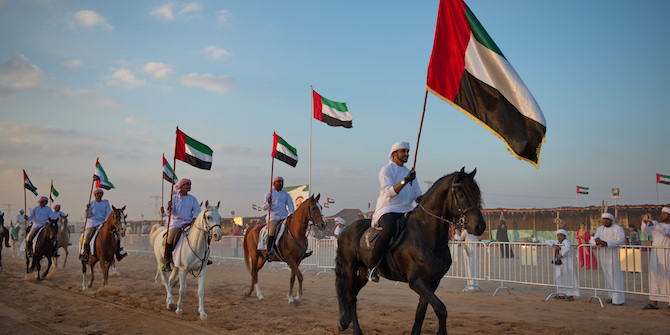by Christian Henderson
This memo was presented at a workshop organised by the LSE Middle East Centre on ‘Mapping GCC Foreign Policy: Resources, Recipients and Regional Effects‘ on 7 October 2015.

As a result of its investment in infrastructure and state owned enterprises (SOEs) such as airlines, ports, and shipping companies, the UAE has become a strategic space that serves as a ‘nexus state’ in the global economy. These services internally provide an important facility for military and corporate power which enhances the UAE’s influence in the international system. Externally, SOEs such as airlines allow the UAE to exert influence by offering a strategic space and by offering connectivity to ‘emerging’ economies.
History of the nexus state in the UAE
At the federal and emirate level, the UAE has sought to encourage the development of a services sector, often by investing in logistical SOEs such as airlines and port management companies. Since the 1970s, Dubai’s strategy of infrastructure investment led to the development of a services economy which served the region. Starting in the mid-2000s, Abu Dhabi also invested heavily in its logistics and travel sector and established the emirate’s national carrier Etihad, as well as other facilities such as Khalifa Port. As a result of this investment, the UAE’s economy is now relatively diversified in comparison to other GCC states. The logistics industry is a central part of this diversification and it is estimated to be worth around $27 billion to the UAE economy.
The increasing number of passengers who use the country’s airports are an obvious indicator of the nexus state. In 2014 it was reported that Dubai International Airport had overtaken Heathrow Airport as the world’s busiest, with 68.9 million passengers. In the same year, 20 million passengers used Abu Dhabi airport and Sharjah Airport recorded 9.5 million passengers in the same year. This passenger traffic is partly a result of the growth of Emirates, the carrier of the emirate of Dubai, and Etihad, the carrier of Abu Dhabi. These two airlines are considered to be ‘super-connectors’, due to their intercontinental routes that connect in the UAE.
In addition to the transport of people, another characteristic of the nexus state is its role in the transport of global cargo traffic, both air and maritime. The main seaport in the country, Jebel Ali, is ranked by the World Shipping Council as the 9th busiest in the world with 13.64 million twenty foot equivalent unit (TEU) and it is the biggest port in the world outside of Asia. Adjacent to Jebel Ali is Al Maktoum International, an airport that is mostly dedicated to cargo and is estimated to be the sixth largest air cargo facility in the world. One of the most important characteristics of the UAE’s status as a nexus state is its ability to provide ‘frictionless’ movement of cargo. The productivity of many ports in the Middle East has been hampered by bureaucratic disorganisation, political instability, conflict and ports, as can be observed in the recent history of Beirut, Aden and Basra. In contrast, Jebel Ali in the UAE claims to provide the most efficient and fastest cargo service in the region.
In order to sustain its role as a strategic space, the UAE needs to be highly flexible. Air transport allows it to take advantage of changes in the global economy. The UAE’s logistical infrastructure, the extent of which is unrivalled in the Gulf, also offers resilience. There are four major airports which, with the exception of Al-Maktoum International, all host their own carriers, and this has allowed the rapid increase in arrivals to the country that would have risked congestion if there were only one major airport. In terms of resilience of seaports, Fujairah provides access to the Indian Ocean and an alternative route to the Straits of Hormuz in the event of conflict. Aside from statistics, other deeper structural characteristics lie behind the UAE’s nexus state. Cheap migrant labour has been crucial to the economic development of the UAE, and the labour of millions of workers from Asia, Africa and the Middle East represent the country’s working class. Air transport enables this control over the labour market due to its facilitation of the rapid transport of labourers, and large numbers of people can be imported or expelled within short periods of time.
Emirates and Etihad
The commercial power of Emirati airlines clearly serves as a foreign policy aid due to their ability to project the country’s image on a global scale. Emirates’ and Etihads’ reputation as high-quality carriers has played a role in building consumer confidence in the UAE. Sponsorship agreements such as the Emirates Stadium in London and the Etihad Stadium in Manchester have developed the brand of the UAE internationally. Less obvious is the manner in which the Emirati airline industry acts as a powerful diplomatic aid given the importance of air links to the economic growth of other countries.
The launch of UAE airlines routes is important for destinations that are seeking to grow their economy and gain legitimacy as business environments, for instance Erbil in the Kurdish Regional Government (KRG) area of Iraq, a statelet that is seeking to establish itself by developing its economy and gaining international recognition. The UAE has four airlines that operate routes to Erbil – Air Arabia, Fly Dubai, Etihad, Emirates and two cargo operators, Etihad Cargo and Emirates Skycargo. The Emirates’ subsidiary, Dnata, has the contract to manage the ground handling and cargo at the airport. Economically air travel is central to the KRG’s attempt to become a hub for businesses seeking to invest in Iraq, but the image of stability and security that is associated with air connections is also politically important. The importance of this air link for the KRG could be observed in March 2015 when all Emirati carriers temporarily suspended their flights to Erbil and Baghdad due to security fears, undermining confidence in the region.
On a global level UAE foreign policy has acted conspicuously in the interests of its airlines. One example is the UAE’s relationship with Canada, in which air politics was the cause of a major dispute. The large number of Canadian citizens with Arab heritage and the 40,000 Canadians residing in the UAE, represents a large market for the UAE’s airline industry. In 2007, Emirates requested additional slots to allow it to increase the number of flights to various Canadian cities, in particular to Toronto. After several years of failed negotiations, the UAE increased pressure on Canada by not renewing an agreement that allowed the Canadian military to use Al-Minhad base for its operations in Afghanistan. The importance of the base to Canada was exemplified by a news report in late 2010 that a plane carrying the Canadian chief of staff and government minister was refused the right to land at the base and had to reroute to Europe. This is an example of the strategic significance of the UAE as a logistical space which offers intercontinental access for military power, and the manner in which the UAE can leverage this importance. The UAE raised the ante further when it imposed a visa regime on Canadian passports whereby the charge for six month visa would be $1000 and a 30 day visa would cost $250. The dispute eventually ended following a nuclear agreement between the two countries and Etihad now has a codeshare agreement with Air Canada that allows it access new traffic for its routes.
Conclusion
The facilities of the nexus state can enhance UAE influence and assist it in maintaining relevance in a region that is in a state of political and economic flux. Its role as a strategic space complements its other sources of influence such as oil reserves, geographical position and foreign investments, and its position at the centre of economies in Africa and Asia will ensure its status as an offshore centre for corporate and military capital, labour and cargo.
Christian Henderson is a PhD candidate at the Development Studies Department at the School of Oriental and African Studies (SOAS). He tweets at @CjvHenderson.
Other memos presented at the workshop
- Pejman Abdolmohammadi, ‘GCC-Iranian Relations and Changes in Iranian Foreign Policy towards its Neighbours’
- Suliman Al Atiqi, ‘GCC Foreign Policy Projections in the Palestinian-Israeli Conflict: A Comparative Analysis of Saudi Arabia & Qatar’
- Will Bartlett, James Ker-Lindsay, Kristian Alexander and Tena Prelec, ‘UAE Policies towards the Western Balkans: Investment Motives and Impacts’
- Karen Young, ‘The New Politics of Gulf Arab State Foreign Aid and Investment: Evidence from the UAE Intervention in Egypt’
- Courtney Freer, ‘Ikhwan Ascendant? Assessing the Influence of Domestic Islamist Sentiment on Qatari Foreign Policy’







UAE has marked its position as a world’s one of the best logistics hub. Due to structural change, economic recovery and construction activity, urban and regional development has accompanied by a high volume of freight traffic, which is responsible for making changes in foreign policies
I enjoy LSE articles and even their tweets are always insightful. Apart from the bigger logistical developments involving the military and big corporates, UAE also seems to have grown in terms of relatively smaller businesses and the logistics that are required to support them. Even DTDC has now come into the UAE and grown international and provides business logistics support to manufacturers and others. It’s great how much more open the UAE now is in terms of businesses like this.